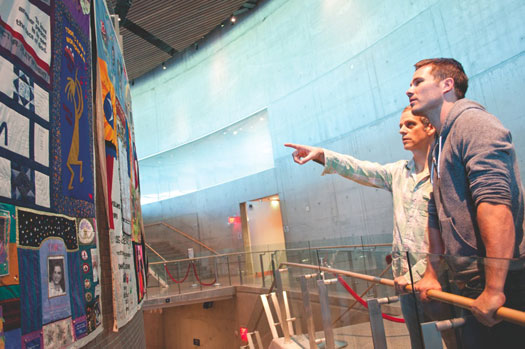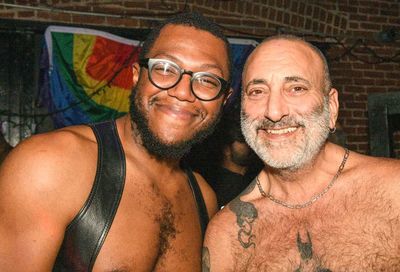Heartfelt
With ''The Normal Heart,'' Arena Stage is putting Patrick Breen and Luke Macfarlane -- two out LGBT actors -- center stage

Patrick Breen, and Luke MacFarlane: ‘The Normal Heart’
(Photo by Todd Franson)
BREEN: It’s absolutely positive. These are the roles that you dream about playing. It’s a modern Hamlet. It’s a contemporary play, in my opinion, of that challenge. That’s why I do it.
If they’re not going to pay you a great deal of money and if you’re not going to be in Rio de Janeiro, then you pick it for the role.
I saw Joe Mantello do this role 80 times, and I went, ”I want a crack at it.” So, when they said they were doing this regional tour, I was hoping that they would ask me to play Ned. I would have thrown my hat in the ring if they hadn’t, but they did ask me to do it. I thought about it for a little bit, but I said, ”Yeah, I got to do it.”
[Macfarlane] called me and he said they asked him to do Felix, and we were both in the Broadway production, and we were like, ”Fuck yeah!” I really like Luke, and the crazy thing is, our characters, Mickey and Craig and Grady, were often connected in the Broadway production. We did all the set changes together, we stood together a lot, we had – Grady and Mickey had this friendship –
MACFARLANE: Completely to the point that, when we were rehearsing the Grady scene, a very small little scene, I totally made up this whole thing that my character is flirting with Mickey.
BREEN: So, we knew we were going to be moving into these roles.
MACFARLANE: Our plan all along.
BREEN: Luckily, I wasn’t working for three months before this. Because it takes a lot. Like an athlete, like you’re preparing for a marathon. You have to eat and train. Sort of, you have to ration your feelings. That’s going to sound really strange –
MACFARLANE: I like that actually.
BREEN: I’m not in a relationship. I was living alone. But, I knew this was coming and I knew that it would require a lot of feelings. I don’t know whether that’s even possible, but you have to sort of ration. I’m glad I wasn’t working for a few months before rehearsing this and then performing it, so that I could just send it out, see what happens. With George’s shape and my own abilities as an actor and the ideas I have for the character and certainly building on the framework that Joe Mantello created. No question about it, I steal a lot of his stuff.
Did you feel that at all?
MACFARLANE: Yeah, I had decided that I had to know all the words, and I had to get that out immediately – which is something that I had never really done before.
BREEN: Did you? Did you come in off book?
MACFARLANE: Yeah, pretty much. That’s my own personal thing. I have a really hard time – I’m dyslexic – I have a hard time with ”words, words, words,” so that was part of me preparing. Most of the rationing of the emotion happens a little bit more in performance for me, like during the week I can’t just say, ”Oh, I’ll meet you at wherever and I’ll do this thing with you,” because I know that I can’t. And I need to be really sensitive to who I talk to on the phone. In fact, it’s actually interesting. Some of my closest friends, our relationships have sort of stopped, because I get really worked up when I talk to them. I just don’t want to do that, and I don’t want to get worked up, so I have to protect myself in that way.
BREEN: It’s so important to perform this play honestly. And it’s not easy to do life and art at the same time, and that’s a common theme for performers, but particularly with a performance of stuff as complicated and as loud as this. In my experience, I’m better when my life is incredibly boring and quiet so that I can then live like a madman in this play.
It’s imperative to express it in the way, in my opinion, that Larry wrote it, from when he wrote it in 1985 and the kind of man he was – and still is. In the ’80s: outrage. And then, to turn it into an artistic work, it has to be heightened. So you think, ”Larry, heightened?” What is that?
Joe said – when I said I was stealing his shit – he said, ”Well, I took everything from the Tasmanian Devil and Charles Nelson Reilly anyway. I stole everything from them, so you can steal from me.” That’s why I do the little spin, because I wanted to put the Tasmanian Devil in.
MW: One of the things that Larry brought up when I talked with him was the age of the audience, and whether the show would open the early AIDS crisis to an audience that came of age not living with that fear that Larry is trying to capture.
MACFARLANE: Let’s be honest, in the theater, we all – every playwright wants to reach younger audiences. Of course, he wants to, especially with this subject matter and the fact that infection rates are still going up, but this is the state of the theater as well. [Older audience members] are the ones that build the glass pavilions, they’re the ones that donate the money.
BREEN: If you could get Justin Beiber to play a role in this, then you could do it – but it’s hard. They’re 21, they didn’t know what the hell this was. To them, AIDS is a chronic illness that you just take a handful of pills for and then you live your life. So, I don’t know how you – and theater’s expensive.
MACFARLANE: And, they have to come all the way to Southwest, which I’m told is a big deal.
I have this big group of people – I’ve joined this CrossFit gym here in D.C. CrossFit Balance –
BREEN: Maybe you’ll get a free month out of that [mention]!
MACFARLANE: Wonderful people! Once sort of early on when I was there, in this moment of boldness that I really don’t normally do, I was like, ”You guys should come! I’ll get the theater to call you and arrange some sort of ticket thing!” So, now, there’s this group of CrossFit people coming to the theater tonight, and I’m sort of terrified. ”I hope we have a good house. I hope the audience is full.”
I’m excited. I don’t know how many of them regularly go to the theater. It’s always exciting when people who don’t normally come to the theater come to the theater. It’s so fantastic. There are so many people who buy their season tickets and schlep their way. But, as an actor, you feel that so much. I don’t think people are aware of how much effect they have when they’re in the audience. You can hear specific voices, you can hear specific laughter, and they literally give you the energy to move through a scene.
So, it is lovely when there’s young people in the audience; you get a whole different thing back from them. And when the audience is not young – old – or quiet, you step off stage and you feel hostile or you’re angry. ”God, why aren’t they giving back to us?”
Support Metro Weekly’s Journalism
These are challenging times for news organizations. And yet it’s crucial we stay active and provide vital resources and information to both our local readers and the world. So won’t you please take a moment and consider supporting Metro Weekly with a membership? For as little as $5 a month, you can help ensure Metro Weekly magazine and MetroWeekly.com remain free, viable resources as we provide the best, most diverse, culturally-resonant LGBTQ coverage in both the D.C. region and around the world. Memberships come with exclusive perks and discounts, your own personal digital delivery of each week’s magazine (and an archive), access to our Member's Lounge when it launches this fall, and exclusive members-only items like Metro Weekly Membership Mugs and Tote Bags! Check out all our membership levels here and please join us today!
























